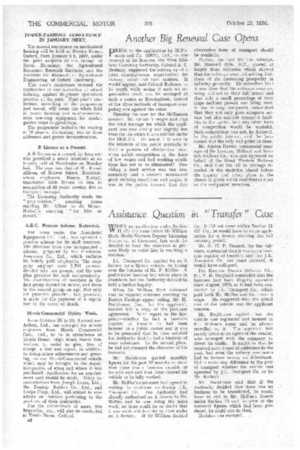Another Big Renewal Case Opens
Page 40

If you've noticed an error in this article please click here to report it so we can fix it.
PRIOR to the application by McNamars and Co. (1921), Ltd., for the renewal of its licences, the West Midland Licensing Authority, Colonel A. S. Redman, suggested the setting up of a joint clearing-house organization for railway, canal and road hauliers. It would appear, said Colonel Redman, to be worth while seeing if such an organization could not be arranged at such a centre as Birmingham, instead oE the three methods of transport competing one against -the other.
Opening the case for the McNamara concern, Mr. Gerald Thesiger said that the total tonnage for which the applicant was now asking was slightly less than that to which it was entitled under the 1933 Act. He asked if it were in the interests of the public generally to Start a process of elimination now, when unrair competition in the form of low wages and bad working conditions has yet to be eliminated? Providing a road service was run economically and a concern maintained good working conditions and wages, it was in the public interest that this alternative form of transport should be available.
Putting the case for the railways, Mr. Maxwell Fyfe, KC., quoted at length from statistics which showed that the railways were not getting their share of the increasing prosperity in industry generally. He submitted that it was clear that the railways were not being utilized to their full extent and that only a small percentage of their large resilient powers was being used. If the railway companies established that they not only gave adequate service but also suitable transport facilities to the trader, then any other form of competition would be wasteful. Such competition was not, he declared, in the public interest, and thern lastnamed was the only real point at issue.
Mr. Ashton Davies, commercial manager of the London, Midland and Scottish Railway Co., who also appeared on behalf of the Great Western Railway Co., said that the fall in tonnage recorded in the statistics paced before the inquiry had taken place in the classes of goods which contributed most to the companies' revenues.




























































































